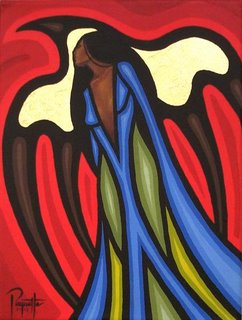
Growing up Native by Carol Geddes is similar to the last two pieces, it is a past account on growing up and dealing with the situation that life has placed you in. From a First Nations perspective, life has been a series of misgivings, Geddes illustrates how since the Second World War her people, the Tlingit Nation, have been disturbed by racism, isolation and the development of the Northern Territories. As Coetzee did in his piece, Scenes From Provincial Life , Geddes used what life was like growing up in harsher times to make a relevant message for the future. Not to be sympathetic but to be understanding and reiterate the message that positive experience can come from negative ones. In Geddes case, she receives her degree but not after going through displacement, physical abuse, and racism. How she succeeded through all the hard years exemplifies how there is hope in struggle, and how you don't wait for atonement you earn it.
What a Certain Visionary Once Said by Tomson Highway is a piece of First Nation literature that shows how effecient one can be with words. It briefly creates imagery and the moral sneaks upon you at the end. For playwriting class we read Dry Lips Outta Move to Kapuskasing, another of Highway's works, it was in the same intrinsic style as this essay, which I find to be the most beneficial style of fiction. Pieces that are farfetched have merit in a whimsical sense but Highway's way of iterating familiar territory makes the reader involved through experience. The moral of this essay, or what a certain visionary said, is to live and leave enough for the next person to enjoy. This message is obvious but overlooked, especially in our Western society with how wasteful and spoiled we can act when we are unknowing or uncaring.






0 comments:
Post a Comment